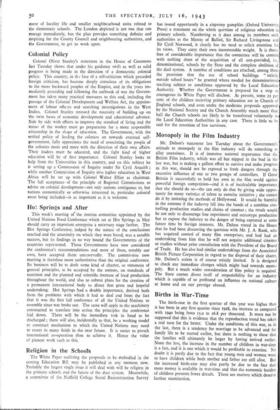Monopoly in the Film Industry
Mr. Dalton's statement last Tuesday about the Government's attitude to monopoly in the film industry will do something to allay uneasiness. It is of immense national importance that the British Film industry, which was all but nipped in the bud in the last war, but is making a gallant effort to survive and make progress in this war, should not be exposed to fresh- dangers through the excessive influence of one or two groups of controllers. If Great Britain is successfully to hold her own in the film world against powerful foreign competition—and it is of incalculable importance that she should do so—she can only do that by giving wide oppor- tunity for many varieties of talent to exercise initiative ; she cannot do it by imitating the methods of Hollywood. It would be harmful in the extreme if the industry fell into the hands of a combine con- trolling production studios and chains of cinemas ; the result would be not only to discourage free experiment and stereotype production but to expose the industry to the danger of being captured at some future time by foreign interests. Mr. Dalton stated in the House that he had been discussing the question with Mr. J. A. Rank, who has acquired control of many film enterprises, and had had an undertaking from him that he will not acquire additional cinemas or studios without prior consultation with the President of the Board of Trade. He has also had similar undertakings from the Associated British Picture Corporation in regard to the disposal of their shares. Mr. Dalton's action is of course strictly limited. It is designed to check any immediate changes which might lead towards mono- poly. But a much wider consideration of film policy is required. The State cannot divest itself of respodsibility for an industry which is capable of so profound an influence on national culture at home and on our prestige abroad.


























 Previous page
Previous page